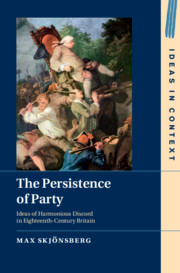Book contents
- The Persistence of Party
- Ideas In Context
- The Persistence of Party
- Copyright page
- Dedication
- Contents
- Figures
- Acknowledgements
- Note on the Text
- Abbreviations
- Introduction
- Chapter 1 Background, Contexts, and Discourses
- Chapter 2 Rapin on the Origins and Nature of Party Division in Britain
- Chapter 3 Bolingbroke’s Country Party Opposition Platform
- Chapter 4 David Hume’s Early Essays on Party Politics
- Chapter 5 Faction Detected? Pulteney, Perceval, and the Tories
- Chapter 6 Hume on the Parties’ Speculative Systems of Thought
- Chapter 7 Hume and the History of Party in England
- Chapter 8 Political Transformations during the Seven Years’ War: Hume and Burke
- Chapter 9 ‘Not Men, But Measures’: John Brown on Free Government without Faction
- Chapter 10 Edmund Burke and the Rockingham Whigs
- Chapter 11 Burke’s Thoughts on the Cause of the Present Discontents
- Chapter 12 Burke and His Party in the Age of Revolution
- Chapter 13 Burke and the Scottish Enlightenment
- Conclusion
- Bibliography
- Index
Chapter 10 - Edmund Burke and the Rockingham Whigs
Published online by Cambridge University Press: 27 January 2021
- The Persistence of Party
- Ideas In Context
- The Persistence of Party
- Copyright page
- Dedication
- Contents
- Figures
- Acknowledgements
- Note on the Text
- Abbreviations
- Introduction
- Chapter 1 Background, Contexts, and Discourses
- Chapter 2 Rapin on the Origins and Nature of Party Division in Britain
- Chapter 3 Bolingbroke’s Country Party Opposition Platform
- Chapter 4 David Hume’s Early Essays on Party Politics
- Chapter 5 Faction Detected? Pulteney, Perceval, and the Tories
- Chapter 6 Hume on the Parties’ Speculative Systems of Thought
- Chapter 7 Hume and the History of Party in England
- Chapter 8 Political Transformations during the Seven Years’ War: Hume and Burke
- Chapter 9 ‘Not Men, But Measures’: John Brown on Free Government without Faction
- Chapter 10 Edmund Burke and the Rockingham Whigs
- Chapter 11 Burke’s Thoughts on the Cause of the Present Discontents
- Chapter 12 Burke and His Party in the Age of Revolution
- Chapter 13 Burke and the Scottish Enlightenment
- Conclusion
- Bibliography
- Index
Summary
In the 1760s, an alternative vision of party emerged: Edmund Burke’s party of principle. This chapter considers the formation of Burke’s party, the Rockingham Whigs, in the context of George III’s accession to the throne and the conclusion of the Seven Years’ War. Burke’s close friend and writing collaborator William Burke introduced him to the circle of the Marquess of Rockingham, and when Rockingham took office as First Lord of the Treasury in July 1765, Burke became his private secretary. At the end of that year, Burke was elected as MP for Wendover and in the following years he emerged as the leading publicist of the Rockingham Whigs. This chapter considers Burke’s early writings in service of his party, especially his understudied Observations on a Late State of the Nation (1769).
Keywords
- Type
- Chapter
- Information
- The Persistence of PartyIdeas of Harmonious Discord in Eighteenth-Century Britain, pp. 238 - 252Publisher: Cambridge University PressPrint publication year: 2021

